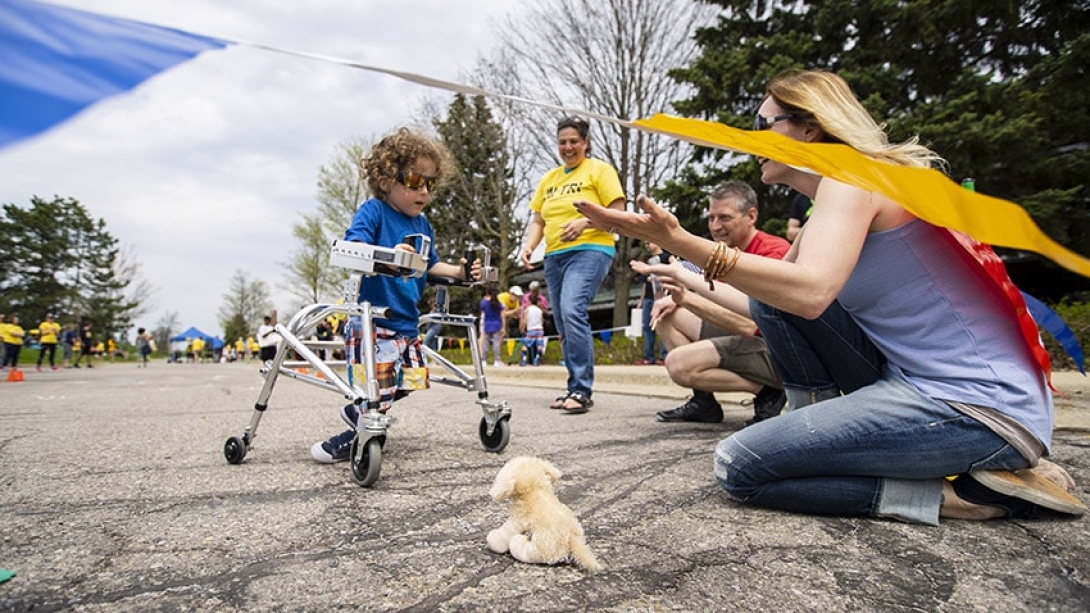Children with cerebral palsy, spina bifida and other special needs spent a day swimming, biking, and walking or running — in true triathlon fashion.
9:00 AM
Author |
Born with cerebral palsy, Ptolemy "PJ" Weathersby walks with the assistance of leg braces.
MORE FROM MICHIGAN: Sign up for our weekly newsletter
But recently, he was in a race that included swimming, biking and completing a walking course.
And now, the 7-year-old can call himself a triathlete.
PJ was among roughly 30 children who completed the first-ever adaptive triathlon organized by University of Michigan C.S. Mott Children's Hospital. Participants ranged from ages 4 to 15 and all had conditions that restrict movement, including cerebral palsy and spina bifida. In traditional triathlon style, the event comprised of an adaptive swim leg, a bike leg and a walk/run leg, all at U-M's MedSport at Domino's Farms.
"People don't think of children with disabilities as athletes. But they are athletes. Every day is a workout for them," says Mott physical therapist Betsy Howell, who organized the event.
"When you work with them in physical therapy, you feel how strong they are and how hard they work. They push themselves every day. They are super-competitive kids," she says. "A triathlon is not something that may have ever been on their radar screen. This gives them an opportunity for that competitive nature to come through in a different way and enjoy a great sense of accomplishment."
Howell has spent years competing in triathlons and wanted the kids to experience the journey and sense of satisfaction that comes with completing such a rigorous athletic event. Her idea for the adaptive triathlon was met with overwhelming support from the Department of Physical Medicine and Rehabilitation, MedSport and dozens of volunteers and staff members who donated time and resources.
On a sunny May weekend, music blared through the MedSport parking lot as crowds of spectators and fans cheered for participants, with many siblings and family members holding up encouraging signs on the sidelines. Applause broke out as each child passed the final finish line.
"Many of these kids spend a lot of time going to their siblings' soccer games, basketball games and other sporting events," Howell says. "Now it's their turn to be the athlete, with their siblings coming to watch them and cheer them on."

The day of the event
Each child was paired up with a staff member who assisted them along the way, from the indoor pool to the outdoor events. Children could compete in the sprint or Olympic distances depending on their abilities.
SEE ALSO: Wheelchair Basketball a Slam Dunk for Kids with Disabilities
"It's really amazing to give these children a chance to do something like this. It brings a sense of normalcy," says Andrea Mitcham as her 8-year-old daughter, April Shaw, biked through a trail of cheering supporters. April has spinal muscular atrophy, type II, a form of muscular dystrophy that prevents her from walking independently.
"It shows them and everyone around them that they are capable of doing more than they think."
The event is among several U-M efforts in recent years to provide more recreational and competitive opportunities for children with special needs. Last year, Mott Physical Medicine and Rehabilitation hosted an adaptive kayaking clinic and launched a wheelchair basketball team.
"PJ had a great time and we loved cheering him on," says Timothy Weathersby, PJ's father. "He was excited about it all day preparing for it. It gave him a chance to swim, race and spend time with his friends.
"It was a great event building upon the other things he does like wheelchair basketball, and it was a reinforcement of all the work we've done so far. It was a great day."

Explore a variety of healthcare news & stories by visiting the Health Lab home page for more articles.

Department of Communication at Michigan Medicine
Want top health & research news weekly? Sign up for Health Lab’s newsletters today!





